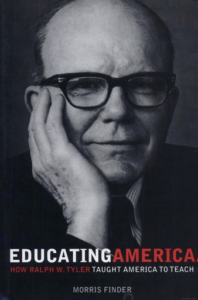 Born in Chicago on April 22, 1902, Ralph W. Tyler was a visionary educator and a leading proponent of student-centered learning. His seminal work “Basic Principles of Curriculum and Instruction” was a best seller when it was published in 1949, and it continues to influence curriculum development to this day. In it, Tyler lays out what has come to be known as “Tyler’s Rationale,” which asserts that effective instruction is organized around four basic questions:
Born in Chicago on April 22, 1902, Ralph W. Tyler was a visionary educator and a leading proponent of student-centered learning. His seminal work “Basic Principles of Curriculum and Instruction” was a best seller when it was published in 1949, and it continues to influence curriculum development to this day. In it, Tyler lays out what has come to be known as “Tyler’s Rationale,” which asserts that effective instruction is organized around four basic questions:
- What educational purposes should the school seek to attain?
- What educational experiences can be provided that are likely to attain these purposes?
- How can purposes be organized?
- How can we determine whether these purposes are being attained?
“Basic Principles” also introduced the concept of student-centered instruction, establishing that “learning takes place through the active behavior of the student; it is what he [the student] does that he learns, not what the teacher does (p. 63).”
Tyler worked with the Truman, Eisenhower, and Johnson administrations to shape the nation’s education policy, contributing to the development of the Elementary and Secondary Education Act in 1965. At the request of the Carnegie Corporation, he chaired a committee that developed the National Assessment of Educational Progress, or NAEP, in 1967. At the time, the introduction of a national test was controversial. It ignited fears of a federal takeover of education and unfair comparisons of students and schools. However, Tyler insisted that NAEP would not produce scores for individual students and schools. Instead results would be disaggregated across students’ demographic characteristics. Today, NAEP is known as the “Nation’s Report Card” and it remains the most reliable national data on student achievement.
About NAEP
![[Source: NAEP]](https://www.learninglist.com/wp-content/uploads/2015/04/20150422-naepoverviewimage.png)
Since NAEP assessments are administered uniformly using the same sets of test booklets across the nation, NAEP results serve as a common metric for all states and selected urban districts. The assessment stays essentially the same from year to year, with only carefully documented changes. This permits NAEP to provide a clear picture of student academic progress over time.
As NAEP moves into computer-based assessments, the assessment administration will remain uniform continuing the importance of NAEP as a common metric. Read more about the future of the NAEP assessment.
[Click here to subscribe to the Learning List blog.]